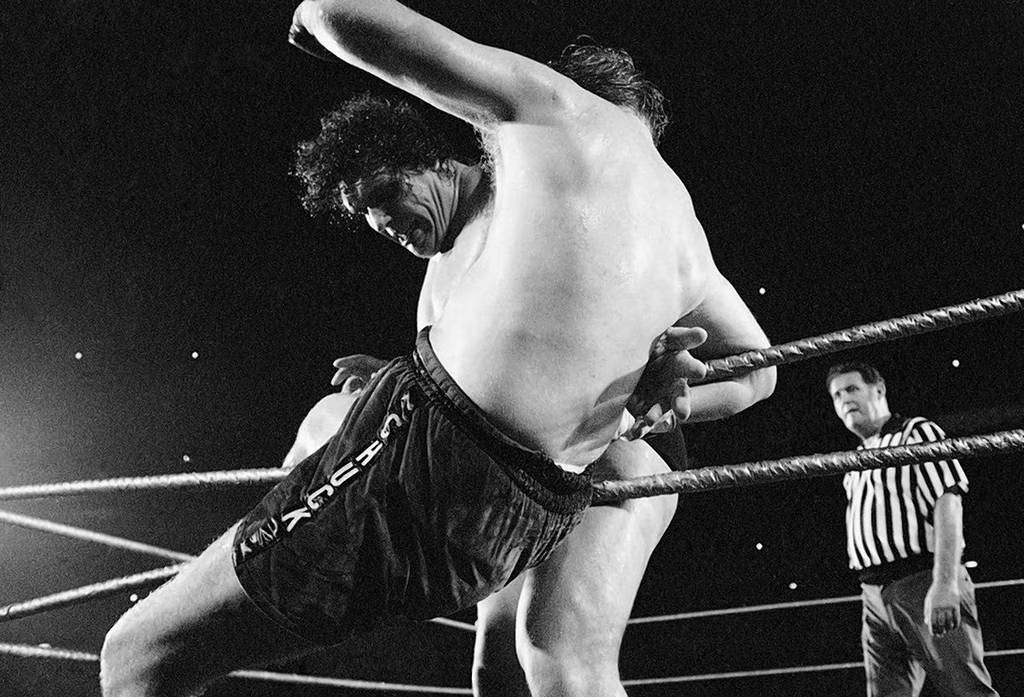This week, The Middlebrow reviewed Ringmaster, a biography of professional wrestling promoter Vince McMahon over at The Washington Independent Review of Books. The day the review came out, McMahon’s WWE announced that it would be sold to Endeavor, owners of the Ultimate Fighting Championship mixed martial arts promotion. Endeavor also owns properties like the William Morris talent agency, which tells you a lot about this deal.
Endeavor plans to merge UFC and WWE into a single public company, combining the sport of UFC with the scripted athletic spectacle of professional wrestling. How the two will interact, if at all, remains to be seen, but it seems likely that the sports will at least trade talents, as they have since the first rumblings of the UFC in the 1990s.
The combat in UFC may be real but the idea was born from storytelling and maybe from the 1988 Jean Claude van Damme movie Bloodsport (which also featured Forrest Whittaker as a hapless FBI agent). Bloodsport is a fun kung fu movie that is based on the purported life story of Frank Dux, a martial artist and ninja who claimed to have traveled frequently to Asia to participate in bare knuckle combat against other mortal artists in a tournament setting. There’s some question about what’s fact and fiction in Dux’s life, but the story of underground mixed martial arts contests does fulfill a need among martial artists and aficionados of martial arts movies to know what fighting style is “the best.” Bloodsport explored that topic, but little else.
Decades before, Bruce Lee had distilled kung fu into a new fighting style called Jeet Kun Do, which he claimed was superior. In the early 1990s, Royce Gracie and his family, who practiced Brazilian Jiu Jitsu made a similar claim that they had stripped the excesses and sport out of martial arts and developed the most effective fighting style. It was common, in the 1990s, for members of the Gracie family to challenge people in other combat sports (mostly famous boxers, including Mike Tyson) to fight on their terms.
When the UFC launched in its first incarnation, it was a vehicle for the Gracie family and the Gracie fighters won most of their fights against Thai boxers, karateka, traditional boxers, judo fighters, olympic wrestlers and kung fu masters with chokes and submissions. One of the complaints was that the “no holds barred” rules of the early UFC meant that fights were won either with quick knockouts or boring grapples that ended in submissions. Audiences did not get twelve rounds of action that boxers like sugar Ray Leonard, Marvin Hager, or Julio Cesar Chavez could deliver. Boxing’s rules made for more spectacular fights while UFC in the 1990s was a freak show.
But even then, UFC fighters like Ken Shamrock switched successfully into professional wrestling and achieved some stardom. Of course, in wrestling, the combat is simulated to tell stories. People argue about exactly when wrestling became the “worked” sport it is today, but it was, at one point, a legitimate athletic contest. It’s just that its promoters figured out that fixing the matches and building stories around them would be more interesting to audiences than just watching two men grapple.

In the 21st century, UFC evolved. Its rules changed to become more structured and to promote more exciting fights and the promotion encouraged its fighters to develop more personality. Since a lot of the fighters started off as fans of professional wrestling, they brought some of that flair to the marketing of their bouts. Brock Lesnar moved between wrestling and MMA for much of a decade and Ronda Rousey went to WWE after retiring from UFC.
Wrestling has always had room for toughs from other combat sports. Antonio Enoki faced Muhammed Ali in a real fight, Andre the Giant took on Chuck Werner at Shea Stadium, Mike Tyson decked Shawn Michaels and Floyd Mayweather got tossed around by The Big Show a few years back. Show also went belly-to-belly with sumo wrestler Akebono Tarō.
What’s happened to pro wrestling over the last four decades is that it’s gone from a sports to reality television presentation. The audience is now invested in the backstage dramas about who is chosen to win and who is chosen to lose. They want to know who the producers want to make into stars. It’s the same with reality TV — it may be “unscripted” but the producers are weighting the scales to tell stories and manufacture celebrities. UFC does that as well.
So… what’s real? None of it. It’s all television (or streaming, or whatever). That WWE sold to a conglomerate that owns a talent agency and mixed martial arts league is fine. It’s certainly better than a sale to the dictators of Saudi Arabia. It will arguably be positive if UFC stars can work their way into the show business of WWE when their fighting careers are over. The only thing to watch out for is that Endeavor is deeply tied to Las Vegas and gambling and the WWE is proposing legalized betting on its fixed matches, with finishes held tightly by auditors and kept even from the performers so that fans can bet on them like they bet on the Oscars. That will ruin the show.
But mixing the fake and the real? That’s what all sports do — scripted and unscripted alike.

